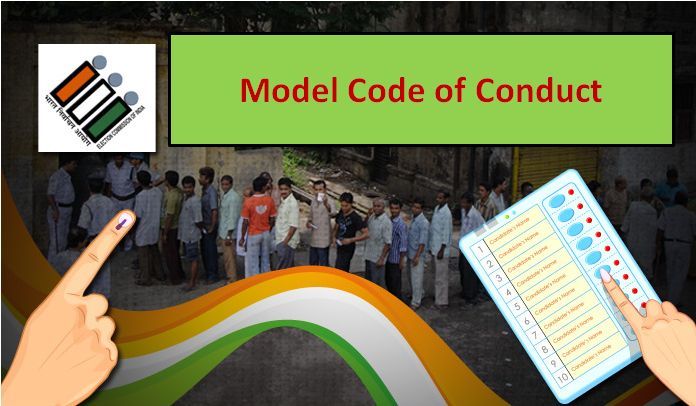What is MCC?
These are the guidelines issued by the Election Commission of India for conduct of political parties and candidates during elections mainly with respect to speeches, polling day, polling booths, election manifestos, processions and general conduct.
Aim: To ensure free and fair elections.

When it comes into force?
- The Model Code of Conduct comes into force immediately on announcement of the election schedule by the commission.
- Election Commission (EC) has announced that Model Code of Conduct comes into force immediately in states where legislative assemblies have been dissolved prematurely.
- The Code remains in force till the end of the electoral process.
Status:
The need for such code is in the interest of free and fair elections. However, the code does not have any specific statutory basis. It has only a persuasive effect. It contains what is known as “rules of electoral morality”. But this lack of statutory backing does not prevent the Commission from enforcing it.
Evolution:
The Commission issued the code for the first time in 1971 (5th Election) and revised it from time to time. This set of norms has been evolved with the consensus of political parties who have consented to abide by the principles embodied in the said code and also binds them to respect and observe it in its letter and spirit.
What it contains?
The salient features of the Model Code of Conduct lay down how political parties, contesting candidates and party(s) in power should conduct themselves during the process of elections i.e. on their general conduct during electioneering, holding meetings and processions, poll day activities and functioning of the party in power etc.
Legal Status of MCC?
- The MCC is not enforceable by law. However, certain provisions of the MCC may be enforced through invoking corresponding provisions in other statutes such as the Indian Penal Code, 1860, Code of Criminal Procedure, 1973, and Representation of the People Act, 1951.
- The Election Commission has argued against making the MCC legally binding; stating that elections must be completed within a relatively short time (close to 45 days), and judicial proceedings typically take longer, therefore it is not feasible to make it enforceable by law.
- On the other hand, in 2013, the Standing Committee on Personnel, Public Grievances, Law and Justice, recommended making the MCC legally binding since most provisions of the MCC are already enforceable through corresponding provisions in other statutes, mentioned above.
The main points of the code are:
- Government bodies are not to participate in any new recruitment process during the electoral process.
- The contesting candidates and their campaigners must respect the home life of their rivals and should not disturb them by holding road shows or demonstrations in front of their houses. The code tells the candidates to keep it.
- The election campaign rallies and road shows must not hinder the road traffic.
- Candidates are asked to refrain from distributing liquor to voters. It is a widely known fact in India that during election campaigning, liquor may be distributed to the voters.
- The election code in force hinders the government or running party leaders from launching new welfare programmes like construction of roads, provision of drinking water facilities etc. or any ribbon-cutting ceremonies.
- The code instructs that public spaces like meeting grounds, helipads, government guest houses and bungalows should be equally shared among the contesting candidates. These public spaces should not be monopolised by a few candidates.